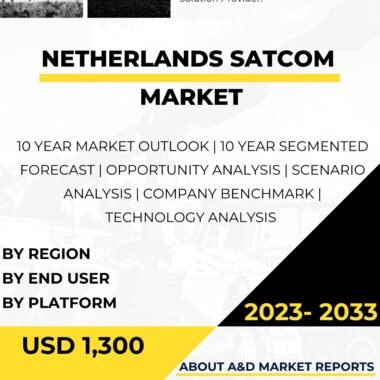Description
a critical component of military communication and surveillance infrastructure.
Commercial SATCOM services cater to various industries, including oil and gas, maritime, aviation, and telecommunications. Companies rely on SATCOM to ensure reliable and uninterrupted communication, monitor remote assets, and support business operations in challenging environments.
The Saudi government and defense forces use SATCOM to establish secure and robust communication networks for defense operations, border surveillance, and disaster response.
SATCOM is essential for broadcasting television and radio signals, reaching remote areas with limited terrestrial infrastructure and enabling wider media coverage across the country.
During natural disasters or emergencies, SATCOM provides a lifeline for communication and coordination among relief agencies, first responders, and affected communities.
The Saudi Arabia SATCOM Market is witnessing significant technological advancements. The development of high-throughput satellites (HTS) is transforming the SATCOM landscape, offering higher data throughput and enhanced connectivity capabilities. HTS technology enables the delivery of broadband internet services to even the most remote regions of Saudi Arabia, supporting the government’s digital inclusion initiatives.
Another emerging trend in the Saudi Arabia SATCOM Market is the increasing adoption of SATCOM-on-the-move (SOTM) solutions. These systems enable communication while on the move, allowing military forces and mobile units to maintain connectivity even in dynamic and challenging environments.
The market is also witnessing a shift towards the adoption of small satellites and low Earth orbit (LEO) satellite constellations. These satellites offer improved data latency and can provide enhanced coverage and capacity, making them ideal for specific applications such as IoT connectivity and global communication.
However, the Saudi Arabia SATCOM Market also faces challenges. Ensuring cybersecurity and protecting satellite communication networks from potential threats is a critical concern for both commercial and defense applications. The government and private sector must invest in robust security measures and encryption protocols to safeguard sensitive information and communication channels.
In conclusion, the Saudi Arabia Satellite Communications Market is a vital and evolving component of the country’s communication and defense infrastructure. As the government continues to invest in digital transformation and connectivity, the demand for SATCOM services is expected to grow.
International SATCOM companies with expertise in satellite technology and communication services will continue to play a significant role in this market. However, the Saudi government’s focus on economic diversification and indigenous industry development will drive increased collaboration and technology transfer initiatives.
By fostering local research and development, training programs, and investments in SATCOM technology and infrastructure, Saudi Arabia aims to build a robust and self-sufficient SATCOM industry, ensuring seamless communication connectivity and supporting its vision of becoming a knowledge-based economy.
As the Kingdom seeks to enhance its communication infrastructure, support critical missions, and expand its defense capabilities, the SATCOM Market will remain a critical area of focus within the broader digital transformation and national security efforts.




